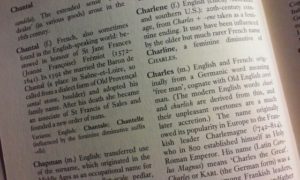John’s Gospel begins with the statement, “In the beginning was the word… and the word was made flesh.” A new child is assigned a name from which its life “fleshes” out.
Surnames are a given. They issue from the ancient lineage, the journey of one’s genetic tribe, a substrate of the deeper unconscious self, filled with many possible manifestations, “oh, he has his eyes, her nose, his temperament,” as the newborn is fitted into the ancestral backdrop of the tribe.

– Photo by Jan Ketchel
Despite the power of the ancestral lineage, the more operative, active name for this life we are in is our first name. This name is assigned, by parents, by whatever system of whim or obligation, to be the name we will be known and defined by. In contrast to our ancestral surname, our first name is how we will be most known in this life.
Outwardly, our name carries with it all the associations our family might have with that name, as well as associations to others with a similar name, not to mention the famous or significant personalities who have been identified by the same name. In short, the expectations and perceptions of the outside world will color and define who we will be seen as in response to our given name.
Inwardly, all names derive from ancient archetypal roots that are associated with qualities of nature, myths, and gods. Hence, our name activates archetypal qualities that are expressed as central themes in our lives. For example, I was assigned the name Charles at birth after my vibrant maternal grandfather, a self-made man. Charles issues from the Germanic karlaz, which translates as free man.
I can think of no better words to capture the leading motif of my own life. I left my family as a teenager and struck out on my own, seeking freedom. I was drawn to Carlos Castaneda, a derivation of Charles, who taught complete freedom from the social order and the freedom to travel as a free spirit in infinity unencumbered by dogma. Carl Jung, another derivation of Charles, has been my other ultimate guide to freeing the self from the intrusion of dissociated or unknown aspects of the self.
With consciousness comes freedom. Together with the teachings of Carlos and Carl, I have been able to extend my reach for freedom in my clinical work, helping others to recapitulate and gain freedom from the blockages of their unknown selves.
My wife was given the name Jan because her mother, as a new teacher, saw young girls struggling to write out their long, complicated names. This led her to determine that girls were dumb, and thus she gave her own daughters short, three letter names, perhaps so they might not appear dumb to future teachers. It wasn’t until later in life that Jan learned this was the reason for her name, but nonetheless the determination that girls and women are just not as smart as boys, applied to her personally before she was even born, has been one that Jan has had to struggle against and prove otherwise her entire life.
In the outer world, when Jan lived in Sweden, she was called up for military service, for Jan was a man’s name in Sweden. Outwardly, naming a woman Jan proved rather foolish. This is the name made flesh.
John, of which Jan is the feminine form, was the name of several Biblical characters and disciples of Christ, including the one I quote at the beginning of this blog. It is an important name borne by saints and popes, as well as royalty. Not dumb after all. At the deepest archetypal level, the Hebrew derivation means God is gracious, and I cannot think of a better description of Jan, who has channeled her way to God at the level of her soul, for she is utterly gracious. Of course, it does not escape me that her Soul Sister in infinity, Jeanne, also derives from the same root, John. As a child Jan never liked her name, but now is quite pleased to have it!
It is interesting to study the roots of the name Donald, given current world conditions. Donald is derived from Old Celtic elements dubno (world) plus val (rule). Thus, one who possesses this name may indeed be challenged with the issue of power and world rule. How one would manifest or resolve this charge could vary greatly, but the underlying motif of reckoning with an urge to rule broadly is likely inevitable.
Here one is reminded of the Don, the term affectionately applied to the Italian Mafia godfather who plays a paternalistic role, as well as don being applied to the Nagual, the leader of a shamanic party, as a sign of respect.
When we explore the etymology of our first name, it is valuable to broaden the exploration to include mythological parallels. For instance, a Lauren, whose name derives from laurel, might explore the myth of Daphne and Apollo where transforming into a laurel tree was Daphne’s sanctuary.
In Carlos Castaneda’s lineage it was recommended that people play with renaming themselves, as a tool to erase personal history. The exercise was intended to break the energetic constraints imposed by the expectations attached to one’s given name.
This practice reminds us that though our lives may have been largely defined by the outer expectations and inner archetypes that define and control a name, we are ultimately free to move beyond those constraints and be in charge of our own destinies.
I do suggest, however, that before we move beyond our given name, we explore it fully in the flesh, and realize and resolve the challenges it has presented us with in this life.
Named and Nameless,
Chuck
